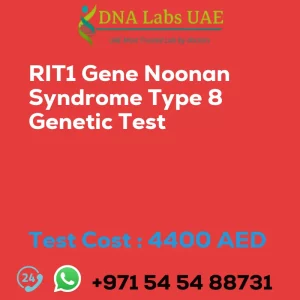PIGN Gene Multiple Congenital Anomalies-Hypotonia-Seizures Syndrome Type 1 Genetic Test
Are you looking for a genetic test to diagnose Multiple Congenital Anomalies-Hypotonia-Seizures Syndrome Type 1 (MCAHS1)? DNA Labs UAE offers the PIGN Gene Multiple Congenital Anomalies-Hypotonia-Seizures Syndrome Type 1 Genetic Test.
Test Details
The PIGN gene is associated with a rare genetic disorder called Multiple Congenital Anomalies-Hypotonia-Seizures Syndrome Type 1 (MCAHS1). This syndrome is characterized by a combination of birth defects, low muscle tone (hypotonia), and seizures.
NGS (Next-Generation Sequencing) Genetic Testing is a type of genetic testing that uses advanced sequencing technologies to analyze multiple genes simultaneously. In the case of MCAHS1, NGS Genetic Testing can be used to identify mutations or variations in the PIGN gene that may be responsible for the syndrome.
By analyzing the patient’s DNA, NGS Genetic Testing can provide valuable information about the presence of specific genetic changes in the PIGN gene. This can help in confirming a diagnosis, predicting disease progression, and informing appropriate treatment and management strategies for individuals with MCAHS1.
It is important to note that NGS Genetic Testing may not be available in all healthcare settings and may require a referral to a specialized genetic testing laboratory. Additionally, genetic counseling is often recommended before and after genetic testing to discuss the potential benefits, limitations, and implications of the test results.
Test Name: PIGN Gene Multiple Congenital Anomalies-Hypotonia-Seizures Syndrome Type 1 Genetic Test
Components:
- Price: 4400.0 AED
- Sample Condition: Blood or Extracted DNA or One drop Blood on FTA Card
- Report Delivery: 3 to 4 Weeks
- Method: NGS Technology
- Test Type: Dysmorphology
- Doctor: Pediatrics
- Test Department: Genetics
Pre Test Information:
Clinical History of Patient who is going for PIGN Gene Multiple Congenital Anomalies-Hypotonia-Seizures Syndrome Type 1 NGS Genetic DNA Test. A Genetic Counselling session to draw a pedigree chart of family members affected with PIGN Gene Multiple Congenital Anomalies-Hypotonia-Seizures Syndrome Type 1 NGS Genetic DNA Test gene PIGN.
| Test Name | PIGN Gene Multiple congenital anomalies-hypotonia-seizures syndrome type 1 Genetic Test |
|---|---|
| Components | |
| Price | 4400.0 AED |
| Sample Condition | Blood or Extracted DNA or One drop Blood on FTA Card |
| Report Delivery | 3 to 4 Weeks |
| Method | NGS Technology |
| Test type | Dysmorphology |
| Doctor | Pediatrics |
| Test Department: | Genetics |
| Pre Test Information | Clinical History of Patient who is going for PIGN Gene Multiple congenital anomalies-hypotonia-seizures syndrome type 1 NGS Genetic DNA Test. A Genetic Counselling session to draw a pedigree chart of family members affected with PIGN Gene Multiple congenital anomalies-hypotonia-seizures syndrome type 1 NGS Genetic DNA Test gene PIGN |
| Test Details |
The PIGN gene is associated with a rare genetic disorder called Multiple Congenital Anomalies-Hypotonia-Seizures Syndrome Type 1 (MCAHS1). This syndrome is characterized by a combination of birth defects, low muscle tone (hypotonia), and seizures. NGS (Next-Generation Sequencing) Genetic Testing is a type of genetic testing that uses advanced sequencing technologies to analyze multiple genes simultaneously. In the case of MCAHS1, NGS Genetic Testing can be used to identify mutations or variations in the PIGN gene that may be responsible for the syndrome. By analyzing the patient’s DNA, NGS Genetic Testing can provide valuable information about the presence of specific genetic changes in the PIGN gene. This can help in confirming a diagnosis, predicting disease progression, and informing appropriate treatment and management strategies for individuals with MCAHS1. It is important to note that NGS Genetic Testing may not be available in all healthcare settings and may require a referral to a specialized genetic testing laboratory. Additionally, genetic counseling is often recommended before and after genetic testing to discuss the potential benefits, limitations, and implications of the test results. |








